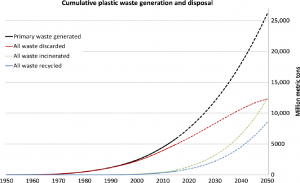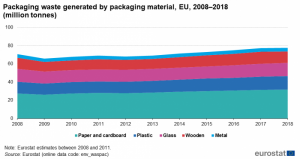Written by: Tamara Nasr
Reading time: 5 minutes
The Reality of Plastic’s Fate
Ever since we were in schools, we were taught that recycling is essential and will save the Earth, which is true, in an ideal world. And for this, we are all supporting recycling and using products with a “recycling logo“, such as plastic, on a daily basis randomly.
However, is this really recyclable? It is evident that the answer cannot be “yes” when we are witnessing marine animals trapped in plastic bags, an increase in cancer rate of occupational and environmental factors, and apparently, plastic seashores and landfills.

Cumulative Waste Management Plastics Disposal
What plastic industries initially did is provide us with single-used plastics products and necessitate it in our lifestyle, and then, with the money they made, many of them created advertisements on how we are abusing the use of plastics and destroying the environment. What a move, right?
Now even though the European countries are working hard to increase the recovery and recycling rates of plastic wastes, which are estimated to be 81% and 66%, respectively, it is still variable among countries and waste products, being wood, glass, and plastic.
As a matter of fact, only 22.5% of plastic is being recycled in Europe.
The fate of plastic is quite known. And most importantly, plastic sources are quite established as well! And this is where the change started and, hopefully, will continue and expand by the driving force of wisdom and awareness among individuals. I believe that the youth are more inclined to work on this matter due to their daily engagement with society and small communities, such as schools, universities, work, etc.
Eliminating the sources of plastic and considering an organic alternative is where our actions should be put. We can keep cleaning seashores and forests from dumps and talk about littering for years, but this will not stop it from happening all over again.
Our projects, funding, and efforts should be oriented toward an alternative product for plastic where competition starts to arise and plastic production decreases.

Packaging Waste Generated
A Biodegradable Future
The change is happening and it’s already out there in forms of eco-friendly businesses and projects, but it has not yet reached a proper amount of audience. This is where social media and blogs like these come in handy!
Many businesses are growing enormously by supporting the Sustainable Development Goals (SDGs) and actually working on them. As there are companies that manufacture organic and biodegradable packaging and tableware by the use of agricultural residuals, like bamboo and banana sticks! So, instead of burning agricultural wastes, we can make use of them!
This way, not only are they are eliminating a great source of plastic but also, they are boosting local agricultural businesses up by indulging them in green business growth because, at the end of the day, these companies are buying the agricultural products to use in the manufacturing processes.
Interdisciplinary businesses are the future where competition is reduced and cooperation is induced. This way, a circular economy is created where agricultural waste is taken advantage of and being used in extraction, designing, and manufacturing packaging products instead of being burnt or discarded.
Hence, instead of using deadly chemicals to make plastic for packaging, we use agricultural residues, which are organic and biodegradable.
There are coffee shops in the UK and Europe that are using vegware instead of card and plastic packaging. Imagine Starbucks, being the most well-reputed and popular coffee shop worldwide, using these biodegradable products. It would be life-changing because an average of 750 customers purchase Starbucks per day. If all of them actually saw this change coming from a successful coffee shop, they would, eventually, be aware and reduce their plastic consumption in their daily life routines!
Vision Is More Than Seeing
It is essential that we’re aware of the fate of plastic and not turn a blind eye to the reality of an environmental crisis because we want to use plastic randomly. Just because we do not live in the polar regions doesn’t mean they’re not melting. In fact, if the Arctic and Antarctic keep melting, there will be ‘simply put’ no source of coldness to cool down the temperature of the planet. This will drastically bring global warming to its peak, resulting in flooding of coastal areas. For example, the floods in New Jersey, Florida. etc., and, eventually, these areas will be covered by the ocean. To illustrate, the devastating flooding that occurred in Europe this year, which ended with 200 deaths and more than 300 unaccounted for. This was a natural disaster, but it’s not normal to happen.
For natural disasters to occur, there should be a significant cause behind it, in this case, global warming. And again, just because we were not affected, it doesn’t mean we will not be affected. Global warming effects move gradually, from mild to extreme, from one area to another.
As a matter of fact, it is because we are still here, we can actually do something about it. Reducing plastic sources will eliminate its incineration and accumulation. Then, only then, will global warming cease to grow, and we will be on the right path.

“Tamara Nasr is our content creator from Lebanon and a recent graduate student from Lebanon University with a Bsc. in Biology. She joined Circle of Sustainable Europe (CoSE) because she believes it gives her the opportunity to be part of the change and also to share her knowledge by writing articles about green economics and recyclable materials in order to involve youth in eco-friendly projects.
References:
